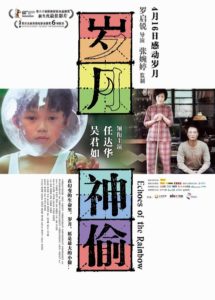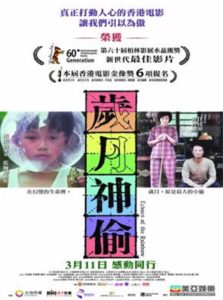Echoes of the Rainbow
岁月神偷
Hong Kong/China, 2010, colour, 1.85:1, 114 mins.
Director: Luo Qirui 罗启锐 [Alex Law].
Rating: 8/10.
This nostalgia-soaked coming-of-age tale in late 1960s Hong Kong avoids cuteness and sentimentality.
Hong Kong, summer 1969. The US is about to put a man on the moon, and eight-year-old Luo Jin’er (Zhong Shaotu), nicknamed Big Ears, sees his life in a Hong Kong Island backstreet through an astronaut-like fishbowl on his head. His father (Ren Dahua) runs a small shoe-making business at the end of the alley, his mother (Wu Junru) is a talkative housewife, his elder brother Luo Jinyi (Li Zhiting) is a champion athlete at Diocesan Boys’ School in Kowloon, and his uncle (Qin Pu) is a barber, one of many small businesses in the backstreet. Luo Jinyi is enamoured of Liu Fangfei (Cai Ying’en), a girl from a rich family that’s planning to send her to the US; his studies and athletic performance seem to be suffering as a result and he incurs the wrath of his father, who’s scraped and saved to send him to the expensive school. In a  typhoon, the family home and business is almost destroyed, putting further financial pressure on the father. And then the family is hit by another blow, relating to Luo Jinyi.
typhoon, the family home and business is almost destroyed, putting further financial pressure on the father. And then the family is hit by another blow, relating to Luo Jinyi.
REVIEW
Echoes of the Rainbow 岁月神偷 is one of a growing series of films (from Mr. Cinema 老港正传, 2007, to the recent Gallants 打擂台, 2010) in which Hong Kong filmmakers have begun to assert their separate Cantonese identity by looking back at “rosier” times as China gradually hijacks the territory’s film industry and future. As such, and being based on the chilhood memories of writer Luo Qirui 罗启锐 [Alex Law], it’s awash with retro references, from popular western songs (The Monkees) and local film stars (Feng Baobao 冯宝宝, Chen Baozhu 陈宝珠, Xiao Fangfang 萧芳芳) to a period when some residents still carried the linguistic and cultural baggage of their Mainland origins – the Shanghainese tailor played by Gu Dezhao 谷德昭 [Vincent Kok], and the Guangdong grandmother, born in the Qing dynasty, of Xia Ping 夏萍. But Luo’s film doesn’t rely just on these comfort zones; his script, though episodic, creates a raft of memorable characters who grow throughout the movie as they meet one challenge after another, and though the film occasionally slips into melodrama (largely with the elder son’s story) it has a simplicity and typically Hong Kong practicality that makes it genuinely moving in the latter stages.
The weakest element is the teenage-love story between the elder son and a girl from a rich family. Compared with the richly-drawn adult community, played by a gaggle of local names in cameo roles, the teenagers simply aren’t very interesting, and the movie loses momentum whenever its strays from the backstreet setting to focus on their subplot. Luo seems at a loss what to do with them, and the performances by Cantopop singer-songwriter Li Zhiting 李治廷 [Aarif Lee] and newcomer Cai Ying’en 蔡颖恩 are bland at best. In contrast, Ren Dahua 任达华 [Simon Yam] gives one of the best performances of his career, utterly believable as a quiet shoemaker whose brittle exterior masks a caring interior. His pairing with Wu Junru 吴君如 [Sandra Ng] as his voluble wife – a role she can play in her sleep – provides the motor for the film, with young Zhong Shaotu 钟绍图 providing non-cute decoration as the younger brother for whom life is still a game.
It’s a measure of the movie’s Hong Kong sensibility that when the story moves briefly to Beijing – in a rather forced co-production requirement – it seems like a fish out of water. China is stereotypically shown as a helpful but cold place – well, it was the middle of the Cultural Revolution – and the relief of the characters (and audience) to get back to warm, argumentative but communal Hong Kong is palpable, and the message unmistakable. Aside from this detour, and the teenage romance, the movie hardly puts a foot wrong, and makes one regret even more that this is only the third directorial outing by Luo (writing-producing partner of director Zhang Wanting 张婉婷 [Mabel Cheung]) since starting with the impressive Painted Faces 七小福 (also a retro item) back in 1988. As the film’s Chinese title says, the biggest thief is time.
Luo’s unshowy direction creates a believable period setting, and even manages to stage an impressive typhoon with minimal resources. Local publicity from the film winning a sidebar prize at the Berlin festival helped save the shooting location – Yongli 永利 [Wing Lee] Street, in Shanghuan 上环 [Sheung Wan] district, one of Hong Kong’s few remaining 1960s neighbourhoods – from being demolished by the government.
CREDITS
Presented by Big Pictures (HK), Dadi Entertainment (CN), Film Development Fund (HK), Dadi Century (Beijing) (CN). Produced by Sky Cosmos Development (HK).
Script: Luo Qirui [Alex Law]. Photography: Lin Zhijian [Charlie Lam]. Editing: Kuang Zhiliang, Chen Zhiwei [Andy Chan]. Music: Li Yunwen [Henry Lai]. Title song: Lu Guanting [Lowell Lo]. Lyrics: Luo Qirui [Alex Law]. Production design: Qiu Weiming [Alfred Yau]. Sound: Chen Zhijian, Li Zhixiong, Zeng Jingxiang [Kinson Tsang]. Action: Huang Weihui. Special effects: Chi Ruitian. Visual effects: Yu Guoliang, Lin Hongfeng, Li Wenjun (Free D Workshop).
Cast: Ren Dahua [Simon Yam] (Luo), Wu Junru [Sandra Ng] (Luo’s wife), Li Zhiting [Aarif Lee] (Luo Jinyi/Desmond; teenage Big Ears), Zhong Shaotu (Luo Jiner/young Big Ears), Qin Pei [Paul Chun] (Mr. Luo’s brother, barber), Cai Ying’en (Liu Fangfei/Flora), Xia Ping (grandmother), Gu Dezhao [Vincent Kok] (Ho, tailor), Xu Anhua [Ann Hui] (Chan, teacher), Liu Guochang [Lawrence Ah Mon] (goldfish seller), Zhang Tongzu [Joe Cheung] (doctor), Gao Zhisen [Clifton Ko] (customer with kids), Xia Chunqiu (printer), Long Jingchang (inter-school quiz master), Liu Tianlan (Liu Fangfei’s mother), Tan Enmei (gambling-den owner’s wife), John Wakefield (Brian, police sergeant), William A. Hill (School head), William Robertson (priest), Jean-Michel Sourd (French teacher), Li Jianxing (Shanghai hairdresser), Lin Yaoqi (shop owner), Liao Ailing (Mrs. Wang), Zhang Yidong (cinema receptionist), Qian Yaorong (cinema usher), Tan Zanqiang (gambling-den owner), Chen Qinghang (cakeshop assistant), Li Xiangrong (pawnshop owner), Chen Chongtai, Mo Enmei, Chen Jiayi, Liang Mianzhang (parents).
Premiere: Berlin Film Festival (Generation Kplus), 14 Feb 2010.
Release: Hong Kong, 11 Mar 2010; China, 16 Apr 2010.
(Review originally published on Film Business Asia, 30 Jun 2010.)
